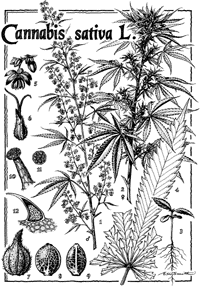F.D.A.'s Report Illuminates
Wide Divide on Marijuana
By KATE ZERNIKE
A Food and Drug Administration statement on Thursday denying any medical benefits of marijuana reinforced the divide between federal officials and the states that have approved the drug's use to ease some medical conditions.
"It's consistent with the long-held federal view on this medicine, and that is that marijuana is the equivalent of heroin and cocaine," said Nathan Barankin, a spokesman for California's attorney general, Bill Lockyer. "California voters disagree."
State officials said the announcement would not affect their laws. But they and federal officials said it clarified the federal government's intention to continue enforcing its laws against marijuana, even in states that allow it for medical purposes.
"It's a very good statement so that people can clearly see what the policy of the United States government is," said Rogene Waite, a spokeswoman for the Drug Enforcement Administration.
While it has always been the drug enforcement agency's policy to enforce laws against marijuana, Ms. Waite said, "now it's clearly out there, so that people don't have to look everywhere to figure this out."
Several officials in the 11 states that allow medical marijuana disputed the F.D.A.'s contention that there was no research supporting the drug's medical use. They noted, in particular, a 1999 review by the National Institute of Medicine, part of the National Academy of Sciences, the nation's most prestigious scientific advisory panel, which found marijuana to be "moderately well-suited" to some conditions, including wasting disease from AIDS and the nausea that often results from chemotherapy.
State officials said that most of their laws had been passed by citizen initiatives.
"The decision was made by the voters. It's not based on any conditions," said James M. Cameron, assistant attorney general in Maine, where the law allowing marijuana use under some conditions took effect in December 1999. "Really, there's nothing that's going to happen — any third parties judging whether these substances are effective — that is going to change Maine law."
But Mr. Cameron and other officials said they had warned people who used marijuana that they were protected under state law only, and could be prosecuted under federal laws.
"The Vermont attorney general's office had always been concerned about the message that the med marijuana program gave that it was legalizing it, when it remains illegal under federal law," said John Treadwell, an assistant attorney general in that office.
A United States Supreme Court decision last year affirmed the federal government's right to enforce those laws in those states.
State officials said they did not believe that the ruling would increase the number of federal prosecutions.
"There's sort of a détente," Mr. Barankin said, in California. "Both sides respect that we have laws that differ. Federal law enforcement agencies for the most part have shown some respect for California law by only going after those individuals who seem to be clearly not in the medical marijuana business for the medical part of it — which are the same people the state law is going after."
The Food and Drug Administration issued its announcement in response to calls from opponents of medical marijuana in Congress, and it was welcomed by the White House Office of National Drug Control Policy, which has long made marijuana its top priority.
Advocates of medical marijuana said the real impact would be in trying to pass new legislation in states like Connecticut, New Jersey and New Mexico.
"We're going to have members of state legislatures say, 'But even the F.D.A. has said there's no medical value,' " said Ethan Nadelmann, executive director of the Drug Policy Alliance, which works to loosen drug laws. "That's where it's going to hurt."
The Supreme Court decision killed efforts to allow medical marijuana in Connecticut, Mr. Nadelmann said, adding, "It had no legal impact, but it created a perception."
Others said the decision would continue to frustrate efforts to research the potential medical benefits of marijuana.
In Vermont, for example, a statute enacted several years ago called for a research program on the therapeutic effects of marijuana. When a legislative group asked more recently why that had not been conducted, the Vermont Health Department said it could not be done under federal law, Mr. Treadwell said.
